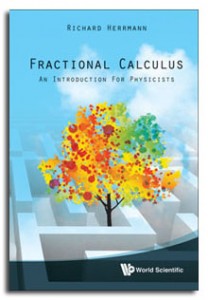From the cover:
Fractional calculus is undergoing rapid and ongoing development. We can already recognize, that within its framework new concepts and strategies emerge, which lead to new challenging insights and surprising correlations between different branches of physics.
This book is an invitation both to the interested student and the professional researcher. It presents a thorough introduction to the basics of fractional calculus and guides the reader directly to the current state-of-the-art physical interpretation. It is also devoted to the application of fractional calculus on physical problems, in the subjects of classical mechanics, friction, damping, oscillations, group theory, quantum mechanics, nuclear physics, and hadron spectroscopy up to quantum field theory.
Fractional Calculus – An Introduction for Physicists
by Richard Herrmann,
World Scientific Publishing, Singapore, February 2011, reprinted 2012, 276 pp, 6 x 9 in.,
ISBN: 978-9814340243
“The book is a solid introduction to fractional calculus that contains, in particular an elucidating section on geometric interpretation of fractional operators… the bulk of the book concentrates on aspects of fractional calculus related to symmetries in quantum mechanics…what is covered is presented in an authoritative, solid style and actually provides very entertaining reading…Overall, Fractional Calculus is an affordable and valuable introduction to the field that will appeal to physicists interested in scientific what-ifs…”
For full details on this review, please visit: Physics Today 65(2), (2012) 55–56;
doi: 10.1063/PT.3.1443
“The book has the property that derived results are directly compared with experimental findings. As a consequence, the reader is guided and encouraged to apply the fractional calculus approach in her/his research area. The reviewer strongly recommends this book for beginners as well as specialists in the fields of physics, mathematics and complex adaptive systems.”
“…the first three chapters actually appear very helpful at the graduate level. Each chapter has a careful precis at the start. There are many analyses illustrating outcomes of fractional analyses…If this [fractional calculus] is the field of your research then this book is essential with numerous references…”
For full details on this review, please visit: Contemporary Physics 53(2), (2012), 187–188; doi:10.1080/00107514.2011.648957

